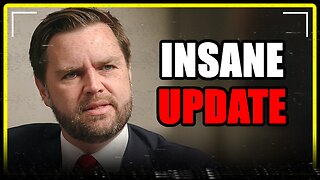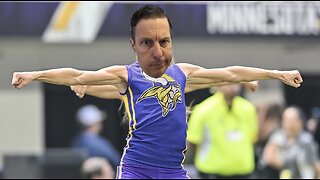Premium Only Content

Episode 1250 Did Christ ever Judge People?
"Do not judge, so that you may not be judged. For with the judgment you pronounce, you will be judged, and with the measure you use, it will be measured to you."
This passage is used quite frequently but quite a lot of people inaccurately. I will have friends that will say “don’t you know Jesus was all merciful and would never judge anyone for anything. So you shouyldnt point out our sins unless you are perfect” Well that simply is not true. Christ is all merciful but he was also all just. This is why many Catholics prefer the “Divine Mercy” devotion and they love to view Christ as the all accepting savior. Is this true? No it isn’t Christ Judged quite a bit when justice required it. So lets go through them and Alex listen up.
Matthew 23:13-36: In this passage, Jesus delivers a series of condemnations and judgments against the scribes and Pharisees, denouncing their hypocrisy and criticizing their actions.
1. "Woe to you, blind guides,
2. "Woe to you, scribes and Pharisees, hypocrites!
3. "Woe to you, scribes and Pharisees, hypocrites!
4. "Woe to you, scribes and Pharisees, hypocrites!
5. "Woe to you, scribes and Pharisees, hypocrites!
6. "Woe to you, scribes and Pharisees, hypocrites!
Matthew 25:31-46: Jesus describes the final judgment, where he separates the righteous from the unrighteous based on their actions towards others. Those who have shown kindness and compassion are welcomed into eternal life, while those who have neglected to do so are condemned.
Luke 11:37-54: Jesus rebukes the Pharisees and teachers of the law for their hypocrisy and the way they neglect justice and love while focusing on external appearances.
Mark 12:38-40: Jesus warns the people about the scribes, who seek recognition and honor while exploiting widows and taking advantage of others. He condemns their actions and hypocrisy.
Luke 19:45-48: Jesus cleanses the temple, overturning the tables of the moneychangers and those selling animals for sacrifice. He judges their exploitation of a holy place and calls it a den of robbers.
Matthew 21:12-13: Similar to the previous example, Jesus drives out those who were buying and selling in the temple, accusing them of turning it into a marketplace and denouncing their actions.
Matthew 15:1-9: Jesus confronts the Pharisees and scribes who accused his disciples of violating tradition by not washing their hands before eating. He exposes their hypocrisy by pointing out how they neglect God's commandments for the sake of their traditions.
Luke 18:9-14: Jesus tells the parable of the Pharisee and the tax collector. In this story, Jesus highlights the contrast between the self-righteousness of the Pharisee and the humble repentance of the tax collector, indicating that the tax collector went home justified rather than the Pharisee.
Mark 10:17-27: A rich young ruler comes to Jesus and asks what he must do to inherit eternal life. Jesus tells him to sell all his possessions and give to the poor, but the young man is unable to do so. Jesus then declares how difficult it is for the rich to enter the kingdom of God.
Matthew 21:18-22: Jesus curses a fig tree that did not bear fruit when he was hungry. The withering of the tree serves as a symbolic judgment against fruitlessness and hypocrisy.
Luke 12:13-21: Jesus tells the parable of the rich fool, condemning the man who stored up treasures for himself but was not rich toward God.
Matthew 15:1-9: Jesus rebukes the Pharisees and scribes for their emphasis on external rituals while neglecting the weightier matters of the law, such as justice, mercy, and faithfulness.
John 8:1-11: The story of the adulterous woman. Although this passage is not found in some early manuscripts, it depicts Jesus refusing to condemn the woman caught in adultery and instead challenges her accusers to examine their own hearts.
"And Jesus went unto mount Olivet. And early in the morning he came again into the temple, and all the people came to him, and sitting down he taught them. And the scribes and the Pharisees bring unto him a woman taken in adultery: and they set her in the midst, And said to him: Master, this woman was even now taken in adultery. Now Moses in the law commanded us to stone such a one. But what sayest thou? And this they said tempting him, that they might accuse him. But Jesus bowing himself down, wrote with his finger on the ground. When therefore they continued asking him, he lifted up himself, and said to them: He that is without sin among you, let him first cast a stone at her. And again stooping down, he wrote on the ground. But they hearing this, went out one by one, beginning at the eldest. And Jesus alone remained, and the woman standing in the midst. Then Jesus lifting up himself, said to her: Woman, where are they that accused thee? Hath no man condemned thee? Who said: No man, Lord. And Jesus said: Neither will I condemn thee. Go, and now sin no more."
-
 LIVE
LIVE
LumpyPotatoX2
2 hours agoSunday Funday on HellDivers - #RumbleGaming
140 watching -
 3:11:52
3:11:52
Esports Awards
4 hours agoEsports Awards: Decade Awards 2025
41.2K3 -
 1:02:58
1:02:58
Sarah Westall
3 hours agoMILITARY WHISTLEBLOWER: How Social Media Military Level Psyops are Manipulating You w/ Patrick Bergy
15.3K4 -
 30:41
30:41
Stephen Gardner
2 hours ago🔥WHITE HOUSE GETS UNEXPECTED BIG WIN!
10.4K14 -
 9:39
9:39
MattMorseTV
4 hours ago $0.55 earnedVance just DROPPED a BOMBSHELL.
10.4K48 -
 2:40:14
2:40:14
DooM49
4 hours agoThe Grind for Battlefield 6 Skins - A-10 Unlocked
672 -
 1:47:49
1:47:49
Jeff Ahern
4 hours ago $0.34 earnedThe Sunday Show!
120K4 -
 LIVE
LIVE
Spartan
3 hours agoExpedition 33, Halo Later on (Maybe)
35 watching -
 LIVE
LIVE
Meisters of Madness
2 hours agoFinals and Wuchang!
59 watching -
 LIVE
LIVE
Lofi Girl
2 years agoSynthwave Radio 🌌 - beats to chill/game to
166 watching